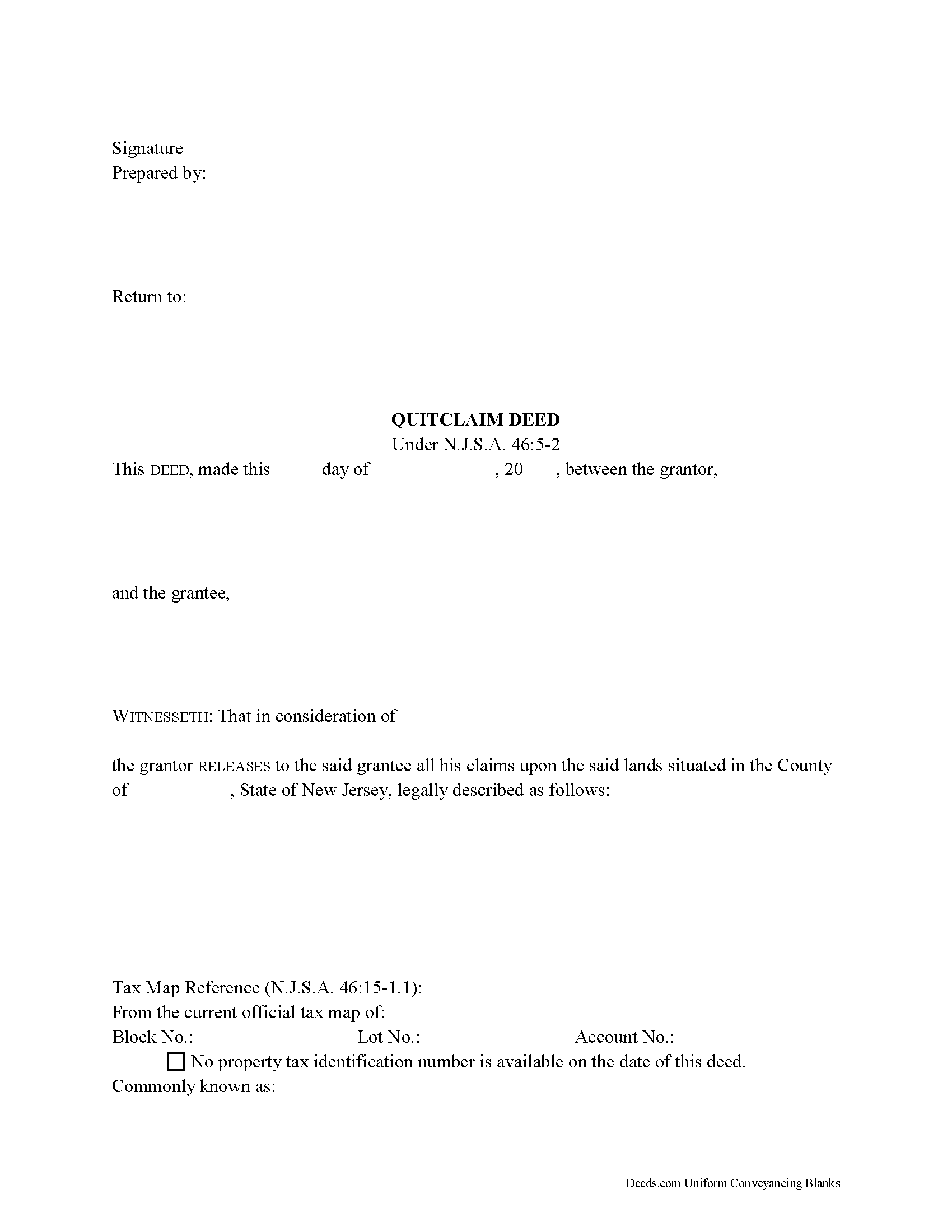

Forms are available immediately after submitting payment.
Immediately after you submit payment, the Middlesex County forms you order will be available for download directly from your account. You can then download the forms to your computer. If you do not already have an account, one will be created for you as part of the order process, and your login details will be provided to you. If you encounter any issues accessing your forms, please reach out to our support team for assistance. Forms are NOT emailed to you.
This indicates the most recent date when at least one of the following occurred:
Yes. Our form blanks are guaranteed to meet or exceed all formatting requirements set forth by Middlesex County including margin requirements, content requirements, font and font size requirements.
Yes. You can re-use the forms for your personal use. For example, if you have more than one property in Middlesex County that you need to transfer you would only need to order our forms once for all of your properties in Middlesex County.
Often when a deed is recorded, additional documents are required by New Jersey or Middlesex County. These could be tax related, informational, or even as simple as a coversheet. Supplemental forms are provided for free with your order where available.
All of our Middlesex County Quitclaim Deed forms are PDFs. You will need to have or get Adobe Reader to use our forms. Adobe Reader is free software that most computers already have installed.
You will need to have Adobe Reader installed on your computer to use our forms. Adobe Reader is free software that most computers already have installed.
No. The blank forms are downloaded to your computer and you fill them out there, at your convenience.
Yes, you can save your deed form at any point with your information in it. The forms can also be emailed, blank or complete, as attachments.
No. Nothing to cancel, no memberships, no recurring fees.
In New Jersey, real property can be transferred from one party to another by executing a quitclaim deed.
Quitclaim deeds are identifiable by the word "release" in the granting clause, and they function to terminate whatever interest the grantor holds at the time of the transfer (N.J.S.A. 46:5-2). In New Jersey, conveyances in which the grantor remises, releases, or quitclaims interest in real property to the grantee without reservations "pass all the estate which the grantor could lawfully convey by deed of bargain and sale" (N.J.S.A. 46:5-3). This means that a quitclaim deed transfers the same quality of title as a bargain and sale deed. Quitclaim deeds differ from bargain and sale deeds, however, in that they do not include a promise from the grantor that he or she has not encumbered the property (N.J.S.A. 46:4-6).
A lawful quitclaim deed includes the grantor's full name, mailing address, and marital status, and the grantee's full name, mailing address, marital status, and vesting. Vesting describes how the grantee holds title to the property. Generally, real property is owned in either sole ownership or in co-ownership.
For New Jersey residential property, the primary methods for holding title are tenancy in common, joint tenancy, and tenancy by entirety. A conveyance to two or more unmarried persons is presumed to create a tenancy in common, unless otherwise stated. A conveyance to a married couple creates a tenancy by entirety, unless otherwise stated (N.J.S.A. 46:3-17, 46:3-17.3).
As with any conveyance of realty, a quitclaim deed requires a complete legal description of the parcel. Recite the prior deed reference to maintain a clear chain of title, and detail any restrictions associated with the property. The deed should meet all state and local standards of form and content for recorded documents.
Sign the deed in the presence of a notary public or other authorized official. For a valid transfer, record the deed at the recording office in the county where the property is located. Contact the same office to confirm accepted forms of payment.
Deeds transferring new construction as the term is defined in N.J.S.A. 46:15-5(1)(g) should contain the words "NEW CONSTRUCTION" in all caps on the first page (N.J.S.A. 46:15-6(2)(c)).
If the conveyance is exempt from transfer taxes, explain why on the face of the deed. See N.J.S.A. 46:15-10 for transfer tax exemptions. Include a completed Affidavit of Consideration with deeds claiming exemption or partial exemption.
Record a Gross Income Tax Form (GIT/REP) with a deed when transferring real property in New Jersey. Ask the local assessor or recording office for help in choosing the correct version of the GIT/REP.
This article is provided for informational purposes only and is not a substitute for legal advice. Contact an attorney with questions about using quitclaim deeds, or for any other issues related to transfers of real property in New Jersey.
(New Jersey QD Package includes form, guidelines, and completed example)